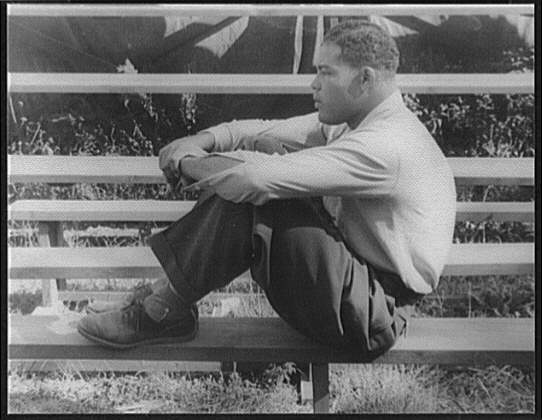The gesture was almost lost in chaotic Las Vegas, but on Friday the life and legacy of Joe Louis was honored at the Clark County Government Center.
Given these politically polarized times, I half expected an asylum of loons to stage a counter-demonstration.
Louis wasn’t from Nevada and never fought in Las Vegas. But in addition to uniting a nation against a common enemy in the runup to World War II and holding the world heavyweight title nearly a dozen years, he was an investor in the star-crossed Moulin Rouge casino in the mid-1950s and spent the final decade of his tumultuous life as a celebrity greeter at Caesars Palace.
He spent the 1970s signing autographs and posing for pictures for fans, playing the free-spending shill and shooting rounds of golf with casino high-rollers. He was often mentioned by visiting writers and social critics, who often portrayed Louis as an exploited fight-game relic, as yesterday’s man, as just another Vegas sideshow.
Larger than life in many ways, he seemed ancient to me the one time I saw him wandering alone through the casino. He was just 66 years old when he died on April 12, 1981, in Las Vegas. After some political wrangling, Alabama-born Joe Louis Barrow was buried with honors at Arlington National Cemetery.
Clark County Commissioner William McCurdy II was drawn to the historic Louis legacy and his Las Vegas connections for many reasons, his heroic victory in 1938 over German heavyweight Max Schmeling and his contributions to the early civil rights movement not least. As the 110th anniversary of the fighter’s birthday approached, McCurdy found a way to honor the man and the American hero by joining a nationwide celebration.
“Being that he had such a significant footprint in Las Vegas, and really is a part of the fabric of the Vegas story, we thought that it was important to not only celebrate his legacy, but also create a legacy awards ceremony,” McCurdy says. “This will be the first ever Brown Bomber Awards ceremony in Las Vegas.”
Few great warriors age well, and Louis was no exception. Nearly invincible in the ring, he lost a fortune in prize money, battled the IRS for two decades, was a prolific womanizer and suffered from drug addiction and mental illness. He was also a genuine American hero and civil rights icon.
As Louis once reflected in what can only be called understatement, “You only live once, but if you do it right, once is enough.”
His friends at Caesars were sometimes ridiculed for trotting him out as a greeter, but they also helped him off life’s canvas when he needed it. Legendary casino host Gene Kilroy was one of those friends.
“I get mad today when they say that Caesars took advantage of Joe Louis,” Kilroy says. “Joe Louis lived like a king over there.”
Whether king or pauper, Louis was celebrated in life. But his wife of more than two decades, trailblazing attorney Martha Jefferson Louis, was the real champ in the family, which included raising adopted children. She stood by her Joe and defended him as his physical and mental faculties failed him.
His Las Vegas funeral, a spectacle held at Caesars Palace, drew 2,500 people. His body was placed in a boxing ring. In a eulogy, the Rev. Jesse Jackson reminded those gathered that “our Joe” defied the simple caricature he was often slapped with. “Our Joe wasn’t the ‘dumb’ Joe you might read about. Our Joe wasn’t dumb — he was generous.”
A few days later, Martha Louis defended her decision to go with a larger-than-life ceremony, telling columnist Dave Kindred, “Nothing about Joe Louis was private. He had friends everywhere. They had a right to see Joe if they wanted to. He belonged to them, too. … He made his fame in the ring, and so we put his body in the ring. He made the ring, the ring made him.”
When she died in 1991, Martha was buried next to her Joe.
Like the language of Las Vegas, and the story of America itself, the complex life of Joe Louis is easy to lose in translation.
I hope he is remembered as he should be. Not for his human failings, or even his greatness in the ring, but for his heroic effort to unite a nation at a critical time in its history.
John L. Smith is an author and longtime columnist. He was born in Henderson and his family’s Nevada roots go back to 1881. His stories have appeared in Time, Readers Digest, The Daily Beast, Reuters, Ruralite and Desert Companion, among others. He also offers weekly commentary on Nevada Public Radio station KNPR.

